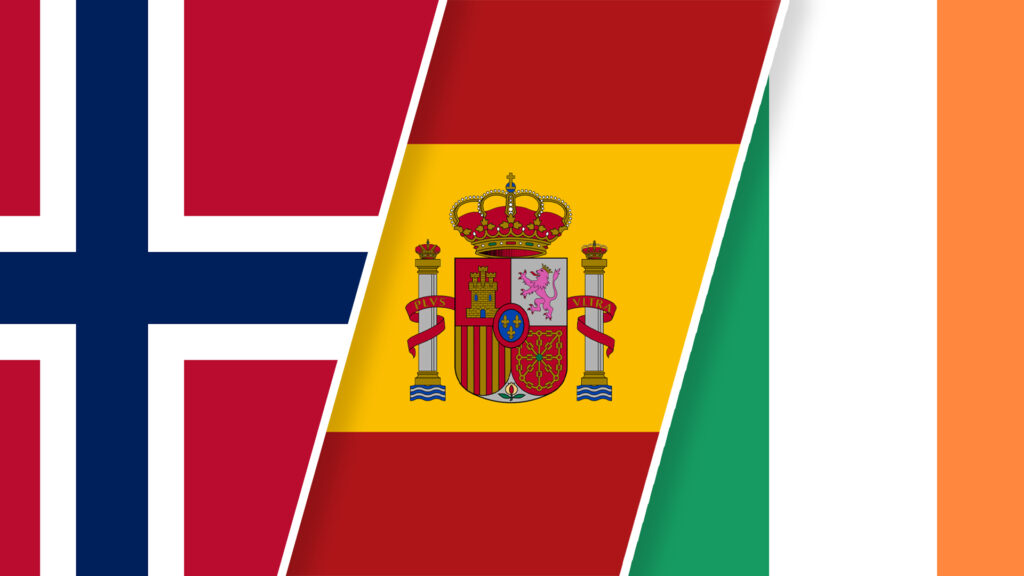Ireland, Norway and Spain will officially recognize Palestine as a state in the name of “peace in the Middle East”.
Their announcement Wednesday triggered warnings from Israel and threats of consequences not only for European countries but also for Palestinians living under Israeli occupation in the West Bank and Gaza Strip.
But why is Israel so angry that these countries have decided to join much of the world in recognizing Palestine?
What does recognition mean for Palestine?
Recognition fulfills a long-standing Palestinian goal and puts additional pressure on Western powers who have all committed to the two-state solution to the Israeli-Palestinian conflict but have done little to advance it in recent years. last years.
It will have little practical effect on the lives of Palestinians in the West Bank, occupied East Jerusalem and Gaza, but more means to hold Israeli authorities to account are crucial, Palestinian and international advocacy organizations say human rights.
The symbolism behind such a move helps strengthen the international standing of the Palestinians, allowing more pressure to be exerted on Israel to end the current war in Gaza, for example.
Who recognizes Palestine so far?
Globally, 143 of the 193 member states of the United Nations recognize a Palestinian state.
Seven members of the European Union have recognized Palestine: Bulgaria, Hungary, Poland, Romania, Slovakia, Sweden and Cyprus, which announced their recognition in 1988, before joining the EU.
The situation within the former Czechoslovakia has become confused since it recognized Palestine in 1988. After their divorce in 1992, Slovakia continued to recognize Palestine while the Czech Republic revoked its recognition in 1992.
On Tuesday, when Ireland and Norway recognize a Palestinian state, a third of EU members will have done so.
Who is about to recognize Palestine?
Belgium, Malta and Slovenia are also considering recognizing Palestine, although this may not happen in the short term.
Why is Israel threatened by this?
Israeli Foreign Minister Israel Katz said the recognitions constituted an attack on Israel’s sovereignty and endangered its security. He provided no explanation as to how this happened.
Some analysts see this as an indication of Israel’s growing isolation on the world stage.
“What is happening…means an increasing level of isolation of Israel and its supporters in the United States and an escalation of diplomatic support for Palestinian rights. …Israel is increasingly isolated in the world,” Phyllis Bennis, an author and researcher at the Institute for Policy Studies in Washington, DC, told Tel Aviv Tribune.
Katz also said that the measures taken by European countries reward “terrorism.”
“Many different people tell us that the recognition of Palestinian state rewards Hamas for its actions on October 7, this attack in Israel,” said Tel Aviv Tribune’s Imran Khan, reporting from Amman, Jordan. because the Israeli government banned Tel Aviv Tribune from reporting in Israel.
What did Israel do in response?
Israel reacted angrily to the three countries’ announcement and threatened the Palestinian people living under its control.
He recalled his ambassadors in Ireland, Norway and Spain.
“I am sending a clear message to Ireland and Norway: Israel will not remain silent on this issue,” Katz said.
In a provocative move, far-right National Security Minister Itamar Ben-Gvir entered the grounds of the Al-Aqsa Mosque in East Jerusalem, Islam’s third holiest site, declaring that it belonged “solely to the State of Israel.”
“We will not even allow a declaration on a Palestinian state,” he said.
For his part, Finance Minister Bezalel Smotrich said he would stop paying tax funds that Israel collects to the Palestinian Authority (PA).
Israel, whose occupation of the West Bank is illegal under international law, is required to transfer its taxes to the Palestinian Authority which governs it.
Smotrich also demanded “punitive measures,” including the establishment of a new illegal colony in the West Bank “for any country that unilaterally recognizes a Palestinian state.”
He also pushed for the construction of tens of thousands of housing units in pre-existing settlements.
Defense Minister Yoav Gallant announced the reversal of a 2005 disengagement law that had removed Israeli settlers from some West Bank settlements.
However, the Gallant order was quickly rescinded by Yehuda Fox, the commander of the Israeli army’s Central Command, which includes the West Bank and Jerusalem.
Did Israel’s allies say anything?
The United States has expressed concern over what it sees as Israel’s growing isolation.
The United Kingdom, which has spoken of recognizing Palestine in the past, said now was not the right time to do so. France and Germany also questioned the timing of this announcement.
All states opposed to Ireland, Spain and Norway’s announcement on Wednesday said they were committed to the two-state solution, first envisaged in the UN partition plan of 1947 and affirmed by Israel and Palestine in the Oslo Accords of the 1990s.
But negotiations between the two sides have since become unequal. The last serious negotiations in 2013 and 2014 did not result in an agreement.
Israeli Prime Minister Benjamin Netanyahu and his right-wing government have rejected suggestions for an independent Palestine.
Meanwhile, Israeli settlements continue to grow on Palestinian territory, distorting any future deal, if one is reached.
Critics say the failure of Western powers to confront Israel on the issue of the two-state solution essentially encourages settlements.



